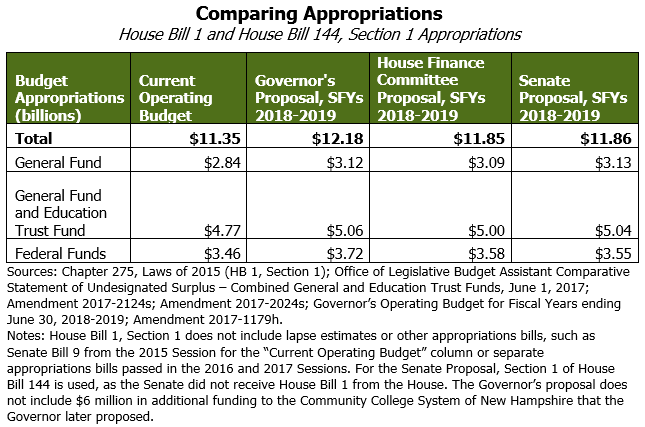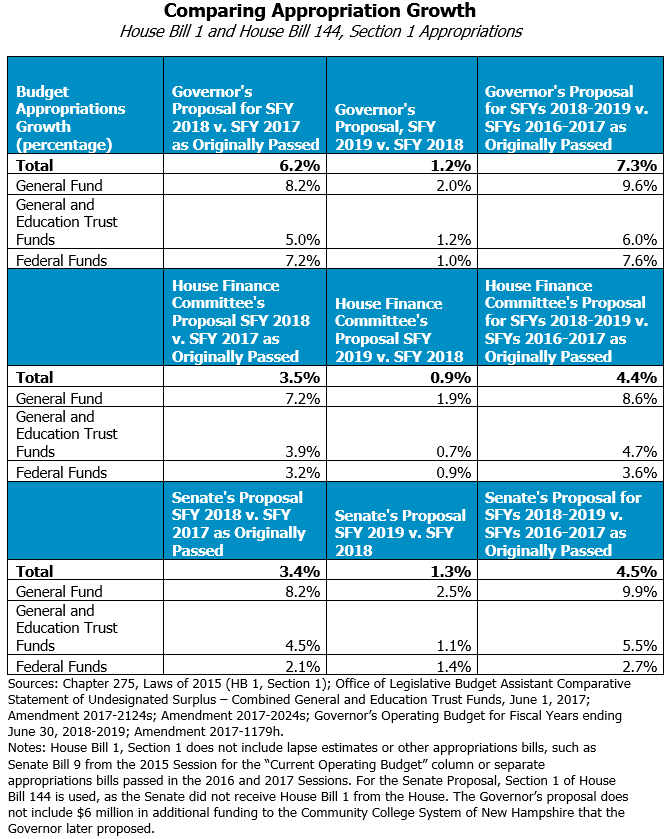The Senate, after considering many amendments, made three changes to the Senate Finance Committee’s version of the State Budget bills, HB 144 and HB 517. The changes:
- altered the title of HB 144 to make it reflect the budget contents of the bill,
- modified a provision designed to boost rates to providers of early intervention services to fix a technical error that would have diverted funds but does not change the total cost of the budget, and
- limited the New Hampshire Drinking Water and Groundwater Advisory Commission’s ability to award grants, loans, or matching funds to sewer infrastructure projects.
To learn more about the Senate’s proposed budget, read NHFPI’s Common Cents blog post on the Senate Finance Committee’s budget, the Senate Finance Committee Budget Briefing to other legislators, and the Office of Legislative Budget Assistant’s breakdown of the differences between the Senate Finance Committee budget and the Governor’s proposed budget.
The Senate’s proposed total budget grows from the current operating budget’s appropriations by about $508 million, or 4.5 percent, when comparing the appropriations in each budget for the two years and not considering appropriations in other bills passed outside of House Bill 1, Section 1, from the 2015 Session. Other modifications in Section 2 of House Bill 1, House Bill 2, and Senate Bill 9 from the 2015 Session are not included, nor are other bills passed (or likely to be passed) during the 2016 and 2017 Legislative Sessions or Section 2 of the Senate’s budget appropriations bill, House Bill 144. Other appropriations already enacted in the 2017 Session most notably include a dairy farmer drought relief appropriations bill, $18 million to fund replacements for heat infrastructure in Concord buildings, and $33.2 million to reconcile higher-than-expected Medicaid caseloads in the current operating budget (the Senate’s proposed version of the budget also included a larger reduction in expected Medicaid caseloads than the Governor proposed in his budget).
The 4.5 percent growth rate, comparing the current operating budget biennium to the Senate proposal and not adjusting for inflation, is slightly higher than the House Finance Committee’s budget proposal’s growth of 4.4 percent. The Senate proposal appropriates $5.9 million more than the House Finance Committee’s budget proposal and $324.7 million less than the Governor’s proposal (including the Governor’s additional proposed allocations for the Community College System). As with the House Finance Committee budget, some of the Senate proposal’s reductions relative to the Governor’s proposal are due to moving federal funds outside of the State Budget, with the expectation that the funds will move through the Joint Legislative Fiscal Committee as they are transferred to the State.
For more information, read NHFPI’s Common Cents blog post highlighting key elements of the Senate Finance Committee’s proposed budget. Further analysis of the Senate’s proposed budget will be forthcoming.
To learn more about how the State collects revenue, see NHFPI’s Revenue in Review resource. For more on the process of creating the State Budget, see NHFPI’s Building the Budget resource. Additional state budget resources are available at NHFPI’s NH State Budget page.


